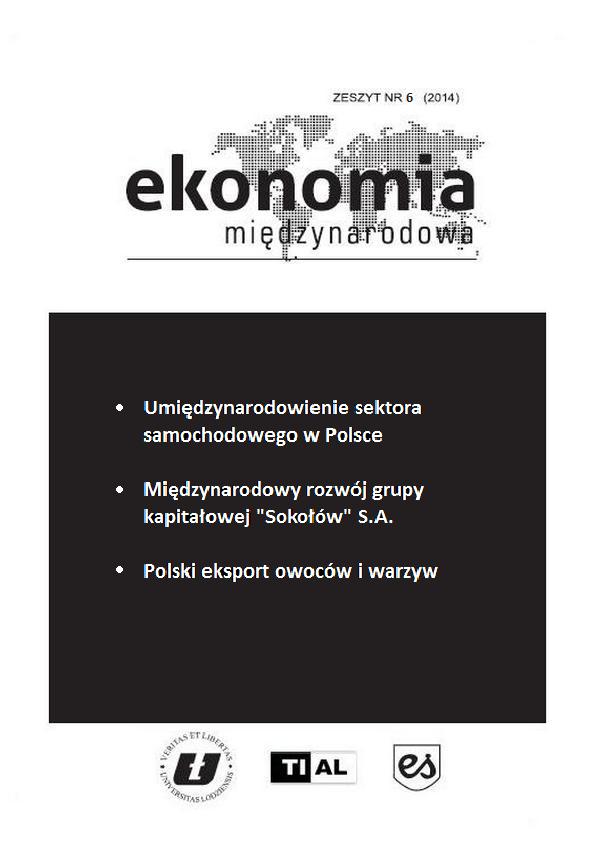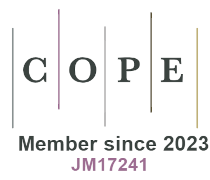Internationalisation of the mid-tech sector. The case of Polish trade in the automotive industry between 2004–2012
DOI:
https://doi.org/10.18778/2082-4440.06.01Keywords:
foreign trade, comparative advantage, international competitiveness, technological change, Poland, automotive industryAbstract
The automotive industry is one of the most important sectors for Polish total exports and imports in terms of value, as well as the factor of trade intensity trade. The paper is aimed at verifying the hypothesis according to which the sector covered in this research does not strengthen the capital intensity of Polish exports and fosters international division of labour between centres and semi-peripheries. Thus, the issues raised here are considered in the context of the middle income trap. The author analysed trade streams in Polish exports and imports through the changes in their structure, evolution of revealed comparative advantages (RCA), import penetration (IMP), revealed advantages in trade (RTA), trade balance and the level of intra-industry trade (IIT) together with an attempt to distinguish the shares of vertical and horizontal exchange. For the purpose of the research, data at the 4- and 6-digit disaggregation level of the Harmonised System were used. As a middle income country Poland is still an attractive location for foreign investments of multinational companies. However, it may preserve the developmental gap. This may be proven by the structure of the trade in the sector covered: cars and parts and accessories of motor vehicles are the most dominant sections, which is consistent with the level of revealed comparatives advantages and revealed advantages in trade. What is also worth noticing are the trade relations with Germany, where one can easily identify a technological dependency.References
Balassa, B. (1965), Trade Liberalisation and Revealed Comparative Advantage, „The Manchester School”, Vol. 33, Issue 2, May.
Google Scholar
DOI: https://doi.org/10.1111/j.1467-9957.1965.tb00050.x
Chludziński, M. (2013), Polska to nie Bantustan, „Rzeczy Wspólne”, nr 11 (1/2013).
Google Scholar
Czarny, E., Śledziewska, K. (2012), Międzynarodowa współpraca gospodarcza w warunkach kryzysu: wnioski dla Polski, PWE, Warszawa.
Google Scholar
„Do Rzeczy”, nr 10/058 z dn. 3–9.03.2014.
Google Scholar
DOI: https://doi.org/10.1088/1475-7516/2014/10/058
Gorynia, M. (2009), Teoretyczne aspekty konkurencyjności [w:] M. Gorynia (red.), Kompendium wiedzy o konkurencyjności, PWN, Warszawa.
Google Scholar
GUS (2013), Główny Urząd Statystyczny, www.stat.gov.pl/gus/wskazniki_makroekon_ PLK_HTML.htm [data dostępu: 14.02.2013 r.].
Google Scholar
Hausner, J. (2013), Gdzie jest mózg naszego państwa?, „Tygodnik Powszechny”, nr 30 (3342) z dn. 28.07.2013 r.
Google Scholar
Hejna, K. (2012), Rekordowa sprzedaż ciągników to zasługa gospodarzy, którzy potrafią sięgać po pieniądze z UE, „Gazeta Pomorska” z dn. 2.02.2012 r., www.pomorska.pl/ apps/pbcs.dll/article?AID=/20120202/ROLNICTWO31/299455736 [data dostępu: 28.02.2014 r.].
Google Scholar
Im, F.G., Rosenblatt, D.(2013), Middle-Income Traps. A Conceptual and Empirical Survey, „Policy Research Working Paper”, No. 6594, The World Bank, September.
Google Scholar
DOI: https://doi.org/10.1596/1813-9450-6594
Iwański, R. (2013), Nowy PROW od 2015 roku, ograniczony zakup maszyn, 6.09.2013, www.farmer.pl/finanse/dotacje-i-doplaty/nowy-prow-od-2015-roku-ograniczonyzakup- maszyn,46177.html [data dostępu: 28 lutego 2014 r.].
Google Scholar
Kieżun, W. (2013), Patologia transformacji, Poltext, Warszawa.
Google Scholar
Kightley, M. (2013), Polityka i reformy Park Chung Hee jako źródło gospodarczego skoku Korei Południowej, Oficyna Wydawnicza SGH, Warszawa.
Google Scholar
Leftwich, A. (1995), Bringing Politics Back In: Towards a Model of the Developmental State, „Journal of Development Studies”, Vol. 31, No. 3, February
Google Scholar
DOI: https://doi.org/10.1080/00220389508422370
Siggel, E. (2006), International Competitiveness and Comparative Advantage: A Survey and a Proposal for Measurement, „Journal of Industry, Competition and Trade”, Vol. 6.
Google Scholar
DOI: https://doi.org/10.1007/s10842-006-8430-x
Staniszkis, J. (2013), Zdolność do formowania własnej polityki, „Rzeczy Wspólne”, nr 11 (1/2013).
Google Scholar
Trade Map (2014), www.trademap.org/SelectionMenu.aspx [data dostępu: 25.02.2014 r.].
Google Scholar
UNCTAD (2012), www.unctadstat.unctad.org/UnctadStatMetadata/Classifications/ Methodology&Classifications.html [data dostępu: 26.10.2012 r.].
Google Scholar
World Bank (2014), www.data.worldbank.org/country/poland [data dostępu: 25.02.2014 r.].
Google Scholar
WTO (2011), World Trade Report 2011. The WTO and Preferential Trade Agreements: From Co-existence to Coherence, Geneva.
Google Scholar
Zioło, Z. (2009), Procesy kształtowania się światowych korporacji i ich wpływ na otoczenie [w:] Z. Zioło, T. Rachwał (red.), Wpływ procesów globalizacji i integracji europejskiej na transformację struktur przemysłowych, Prace Komisji Geografii Przemysłu PTG nr 12, Wydawnictwo Naukowe Akademii Pedagogicznej w Krakowie, Warszawa-Kraków.
Google Scholar
DOI: https://doi.org/10.24917/20801653.12.1
Downloads
Published
How to Cite
Issue
Section
License

This work is licensed under a Creative Commons Attribution-NonCommercial-NoDerivatives 4.0 International License.









